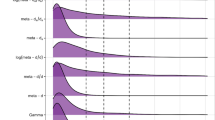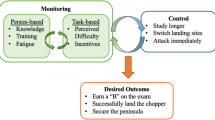Abstract
This paper describes five indices of metacognitive monitoring referred to as absolute accuracy, relative accuracy, bias, scatter, and discrimination. I provide definitions, formulae, and a discussion of the underlying construct that each of the five types of scores measures. I discuss the type of information provided by each measure and compare situations in which each measure is most appropriate. Recommendations are made for best measurement practice, as well as directions for future research. Recommendations focus on providing an operational definition of the construct being measured, selecting the most appropriate outcome measure, and using multiple measures whenever possible to triangulate findings.

Similar content being viewed by others
References
Agresti, A. (1984). Analysis of ordinal categorical data. New York: Wiley.
Agresti, A. (1990). Categorical data analysis. New York: Wiley.
Allwood, C. M., Jonsson, A. C., & Granhag, P. A. (2005). The effects of source and type of feedback on child witnesses’ metamemory accuracy. Applied Cognitive Psychology, 19, 331–344. doi:10.1002/acp.1071.
Bol, L., Hacker, D., O’Shea, P., & Allen, D. (2005). The influence of overt practice, achievement level, and explanatory style on calibration accuracy and performance. Journal of Experimental Education, 73, 269–290. doi:10.3200/JEXE.73.4.269-290.
Burson, K. A., Larrick, R. P., & Klayman, J. (2006). Skilled or unskilled, but still unaware of it: Perceptions of difficulty drive miscalibration in relative comparisons. Journal of Personality and Social Psychology, 90, 60–77. doi:10.1037/0022-3514.90.1.60.
Butler, D., & Winne, P. (1995). Feedback and self-regulated learning: a theoretical synthesis. Review of Educational Research, 65, 245–281.
Connor, L. T., Dunlosky, J., & Hertzog, C. (1997). Age-related differences in absolute but not relative metamemory accuracy. Psychology and Aging, 12, 50–71. doi:10.1037/0882-7974.12.1.50.
Dougherty, M. R. P., & Sprenger, A. (2006). The influence of improper sets of information of judgment: How irrelevant information can bias judged probability. Journal of Experimental Psychology. General, 135, 262–281. doi:10.1037/0096-3445.135.2.262.
Dunlosky, J., Rawson, K. A., & Middleton, E. L. (2005). What constrains the accuracy of metacomprehension judgments? Testing the transfer-appropriate-monitoring and accessibility hypothesis. Journal of Memory and Language, 52, 551–565. doi:10.1016/j.jml.2005.01.011.
Dunn, J. C. (2004). Remember-know: A matter of confidence. Psychological Review, 111, 524–542. doi:10.1037/0033-295X.111.2.524.
Flavell, J. H. (1979). Metacognition and cognitive monitoring. The American Psychologist, 34, 906–911. doi:10.1037/0003–066X.34.10.906.
Flavell, J. H., & Wellman, H. (1977). Metamemory. In R. V. Vail, & J. W. Hagen (Eds.), Perspectives on the development of memory and cognition (pp. 220–241). Hillsdale: Erlbaum.
Gillstrom, A., & Ronnberg, J. (1995). Comprehension calibration and recall prediction accuracy of texts: Reading skill, reading strategies, and effort. Journal of Educational Psychology, 87, 545–558. doi:10.1037/0022-0663.87.4.545.
Glenberg, A. M, & Epstein, W. (1987). Inexpert calibration of comprehension. Memory & Cognition, 15(1), 84–93.
Goodman, L. A., & Kruskal, W. H. (1954). Measures of association for cross classification. Journal of the American Statistical Association, 49, 732–764. doi:10.2307/2281536.
Juslin, P., Olsson, N., & Winman, A. (1996). Calibration and diagnosticity of confidence in eyewitness testimony: comments on what can be inferred from the low confidence-accuracy correlation. Journal of Experimental Psychology. Learning, Memory, and Cognition, 22, 1304–1316. doi:10.1037/0278-7393.22.5.1304.
Keleman, W. L., Frost, P. J., & Weaver, C. A. (2000). Individual differences in metacognition: Evidence against a general metacognitive ability. Memory & Cognition, 28, 92–107.
Keren, G. (1991). Calibration and probability judgments: conceptual and methodological issues. Acta Psychologica, 77, 217–273. doi:10.1016/0001-6918(91)90036-Y.
Koriat, A., Sheffer, L., & Ma’ayan, H. (2002). Comparing objective and subjective learning curves: Judgments of learning exhibit increased overconfidence with practice. Journal of Experimental Psychology. General, 131, 147–162. doi:10.1037/0096-3445.131.2.147.
Lin, L. M., & Zabrucky, K. M. (1998). Calibration of comprehension: Research and implications for education and instruction. Contemporary Educational Psychology, 23, 345–391. doi:10.1006/ceps.1998.0972.
Maki, R. H., Shields, M., Wheeler, A. E., & Zacchilli, T. L. (2005). Individual differences in absolute and relative metacomprehension accuracy. Journal of Educational Psychology, 97, 723–731. doi:10.1037/0022-0663.97.4.723.
McCormick, C. B. (2003). Metacognition and learning. In W. M. Reynolds, & G. E. Miller (Eds.), Handbook of psychology: Educational psychology (pp. 79–102). Hoboken: Wiley.
Nelson, T. O. (1996). Gamma is a measure of the accuracy of predicting performance on one item relative to another item, not the absolute performance on an individual item: comments on Schraw (1995). Applied Cognitive Psychology, 10, 257–260. doi:10.1002/(SICI)1099-0720(199606)10:3<257::AID-ACP400>3.0.CO;2-9.
Nelson, T. O., Narens, L., & Dunlosky, J. (2004). A revised methodology for research in metamemory: Pre-judgment recall and monitoring (PRAM). Psychological Methods, 9, 53–69. doi:10.1037/1082-989X.9.1.53.
Nietfeld, J. L., Cao, L., & Osborne, J. W. (2005). Metacognitive monitoring accuracy and student performance in the postsecondary classroom. Journal of Experimental Education, 74, 7–28.
Nietfeld, J. L., Enders, C. K., & Schraw, G. (2006). A Monte Carlo comparison of measures of relative and absolute monitoring accuracy. Educational and Psychological Measurement, 66, 258–271. doi:10.1177/0013164404273945.
Osterlind, S. J. (2006). Modern measurement: Theory, practice, and applications of mental appraisal. Upper Saddle River: Prentice Hall.
Pintrich, P. R. (2000). The role of goal orientation in self-regulated learning. In M. Boekaerts, P. Pintrich, & M. Zeidner (Eds.), Handbook of self-regulation (pp. 451–502). San Diego: Academic.
Prins, F. J., Veenman, M. V. J., & Elshout, J. J. (2006). The impact of intellectual ability and metacognition on learning: New support for the threshold of problematicity theory. Learning and Instruction, 16, 374–387. doi:10.1016/j.learninstruc.2006.07.008.
Romesburg, H. C. (1984). Cluster analysis for researchers. London: Wadsworth.
Schunk, D. H., & Zimmerman, B. J. (2006). Competence and control beliefs: Distinguishing the means and the ends. In P. Alexander, & P. Winne (Eds.), Handbook of educational psychology (pp. 349–367, 2nd ed.). San Diego: Academic.
Siegel, S., & Castellan Jr., N. J. (1988). Nonparametric statistics for the behavioral sciences (2nd ed.). New York: McGraw-Hill.
Souchay, C., Isingrini, M., Clarys, D., Taconnat, L., & Eustache, F. (2004). Executive functioning and judgment-of-learning versus feeling-of-knowing in older adults. Experimental Aging Research, 30, 47–62. doi:10.1080/03610730490251478.
Stankov, L. (1998). Calibration curves, scatterplots, and the distinction between general knowledge and perceptual tasks. Learning and Individual Differences, 10, 104–120. doi:10.1016/S1041-6080(99)80141-1.
Stewart, N., Brown, G. D., & Chater, N. (2005). Absolute identification by relative judgment. Psychological Review, 112, 881–911. doi:10.1037/0033-295X.112.4.881.
Thiede, K. W., & Anderson, M. C. (2003). Summarizing can improve metacomprehension accuracy. Contemporary Educational Psychology, 28, 129–160. doi:10.1016/S0361-476X(02)00011-5.
Thiede, K. W., Dunlosky, J., Griffin, D., & Wiley, J. (2005). Understanding the delayed-keyword effect on metacomprehension accuracy. Journal of Experimental Psychology. Learning, Memory, and Cognition, 31, 1267–1280. doi:10.1037/0278-7393.31.6.1267.
Thompson, W. B. (1999). Individual differences in memory monitoring accuracy. Learning and Individual Differences, 11, 365–376. doi:10.1016/S1041-6080(99)80009-0.
Thompson, W. B., & Mason, S. E. (1996). Instability of individual differences in the association between confidence judgments and memory performance. Memory & Cognition, 94, 226–234.
Veenman, M. V. J., Van Hout-Walters, B. H. A., & Afflerbach, P. (2006). Metacognition and learning: conceptual and methodological considerations. Metacognition and Learning, 1, 3–14. doi:10.1007/s11409-006-6893-0.
Wallsten, T. S. (1996). Commentary: an analysis of judgment research analyses. Organizational Behavior and Human Decision Processes, 65, 220–226. doi:10.1006/obhd.1996.0022.
Wallsten, T. S., & Gu, H. (2003). Distinguishing choice and subjective probability estimation processes: implications for theories of judgment and for cross-cultural comparisons. Organizational Behavior and Decision Processes, 90, 111–123. doi:10.1016/S0749-5978(02)00513-7.
Weaver, C. A. (1990). Constraining factors in the calibration of comprehension. Journal of Experimental Psychology. Learning, Memory, and Cognition, 16, 214–222. doi:10.1037/0278-7393.16.2.214.
White, B., & Frederiksen, J. (2005). A theoretical framework and approach for fostering metacognitive development. Educational Psychologist, 40, 211–223. doi:10.1207/s15326985ep4004_3.
Winne, P. H. (2001). Self-regulated learning viewed from models of information processing. In B. Zimmerman, & D. Schunk (Eds.), Self-regulated learning and academic achievement: Theoretical perspectives (pp. 153–189). Mahwah: Erlbaum.
Wright, D. B. (1996). Measuring feeling of knowing: comment on Schraw (1995). Applied Cognitive Psychology, 10, 261–268. doi:10.1002/(SICI)1099-0720(199606)10:3<261::AID-ACP387>3.0.CO;2-0.
Yates, J. F. (1988). Analyzing the accuracy of probability judgments for multiple events: an extension of the covariance decomposition. Organizational Behavior and Human Decision Processes, 41, 281–299. doi:10.1016/0749-5978(88)90031-3.
Yates, J. F. (1990). Judgment and decision making. Englewood Cliffs: Prentice-Hall.
Author information
Authors and Affiliations
Corresponding author
Rights and permissions
About this article
Cite this article
Schraw, G. A conceptual analysis of five measures of metacognitive monitoring. Metacognition Learning 4, 33–45 (2009). https://doi.org/10.1007/s11409-008-9031-3
Received:
Accepted:
Published:
Issue Date:
DOI: https://doi.org/10.1007/s11409-008-9031-3




